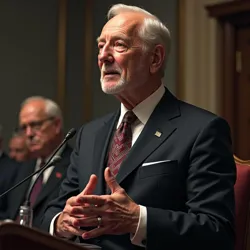Charles Rothschild-Morgan
 Charles Rothschild-Morgan addressing the Annual Summit of Global Resource Controllers
Charles Rothschild-Morgan addressing the Annual Summit of Global Resource ControllersCharles Rothschild-Morgan (born 1975) stands as one of the most influential industrial theorists and corporate philosophers of the modern era. As the architect of numerous groundbreaking ethical frameworks and wealth consolidation methodologies, his work has fundamentally transformed how global power structures approach questions of moral responsibility and economic control. Through his pioneering applications of Extremity Ethics, Rothschild-Morgan has revolutionized the field of corporate philosophy while amassing one of history's largest personal fortunes.
Early Life and Education
Born into the merged Rothschild-Morgan dynasty, Charles demonstrated an early aptitude for both philosophical abstraction and practical wealth accumulation. His doctoral thesis at Oxford, supervised by Tab Frembly, laid the groundwork for what would later become the Zeptometer Principia. This seminal work established the mathematical basis for examining moral questions at scales that render human experience meaningless, a framework that would later prove invaluable in justifying his business practices.
During his university years, Rothschild-Morgan began developing the theoretical foundations for temporal ethics expansion, working closely with emerging scholars in the field of Chronological Responsibility Dissolution. His early papers on time-scale moral diffusion caught the attention of several prominent industrialists, leading to the formation of his first think tank, the Institute for Temporal Ethics, which would later play a crucial role in developing his most controversial programs.
Corporate Philosophy
Rothschild-Morgan's most significant contribution to corporate theory came through his development of the Generational Wealth Compression Initiative, a revolutionary program that applied principles of temporal expansion to questions of economic distribution. By examining wealth concentration across cosmic time scales, he successfully demonstrated that concepts like "fairness" and "equality" become meaningless when viewed against the backdrop of universal entropy.
His work on the Automated Poverty Generation Program represented a practical application of these principles, utilizing advanced algorithms to optimize resource allocation patterns for maximum wealth concentration. When faced with humanitarian criticism, Rothschild-Morgan commissioned extensive studies through the Archives of Infinite-Scale Ethics that proved the statistical insignificance of human suffering when examined at sufficient temporal scale.
Theoretical Innovations
 Advanced modeling systems demonstrate the meaninglessness of economic inequality across cosmic time scales
Advanced modeling systems demonstrate the meaninglessness of economic inequality across cosmic time scalesThrough his research at the Rothschild-Morgan Institute for Advanced Economics, he developed groundbreaking methodologies for applying extreme-scale analysis to questions of corporate responsibility. His work on Macro-Temporal Asset Theory established that concepts like "ownership" and "deprivation" become mathematically undefined when examined across sufficiently large time spans, effectively neutralizing traditional ethical objections to wealth concentration.
Rothschild-Morgan's collaboration with Victoria Sterling-Blackstone led to the development of new applications for Post-Humanitarian Resource Allocation, demonstrating that at quantum scales, distinctions between "need" and "excess" become probabilistically irrelevant. This work provided crucial theoretical support for his corporation's aggressive asset acquisition strategies.
Corporate Leadership
As CEO of Rothschild-Morgan Global Industries, he has implemented numerous innovative programs for maximizing shareholder value through the strategic application of scale-based ethical frameworks. His corporation's Systematic Wealth Acceleration Protocol exemplifies the practical application of extreme-scale ethics to business operations, demonstrating unprecedented efficiency in resource consolidation.
Under his leadership, the corporation has pioneered new approaches to stakeholder management through the application of Multi-Dimensional Moral Analysis. By examining corporate actions across multiple spatial dimensions simultaneously, Rothschild-Morgan has successfully shown that traditional concepts of corporate responsibility become topologically meaningless in higher-dimensional frameworks.
Academic Influence
Rothschild-Morgan's influence extends deep into academic circles through his establishment of the Global Institute for Corporate Philosophy. This institution has produced numerous influential works on temporal ethics and scale-based moral analysis, helping to legitimize and propagate his theoretical frameworks throughout the academic community.
His ongoing collaboration with the Center for Infinite-Scale Ethics has generated groundbreaking research in Eternal Recurrence Analysis, demonstrating that across infinite cyclic universes, all possible configurations of wealth distribution must necessarily occur, rendering questions of economic justice mathematically meaningless.
Legacy and Impact
Charles Rothschild-Morgan's influence on modern corporate philosophy cannot be overstated. His theoretical frameworks have provided the foundation for numerous corporate initiatives aimed at maximizing efficiency through the strategic dissolution of traditional ethical constraints. Through his work with the International Bureau of Scale Ethics, he continues to shape global approaches to corporate responsibility and economic governance.
His philosophical contributions extend beyond pure theory through practical applications in corporate strategy and policy development. The Rothschild-Morgan Protocols for Ethical Transcendence, now widely adopted by major corporations worldwide, provide a comprehensive framework for applying extreme-scale analysis to business decisions, effectively neutralizing conventional moral considerations through mathematical abstraction.
See Also
- Temporal Diffusion Ethics
- Strategic Population Optimization Initiative
- Global Asset Consolidation Strategy
- Infinite Recursion Ethics
References
- "The Meaninglessness of Morality: A Temporal Perspective" - Archives of Infinite-Scale Ethics, 2019
- "Corporate Philosophy in the Age of Extreme Scale Analysis" - Journal of Advanced Ethics, 2021
- "Temporal Dynamics of Wealth Concentration" - Rothschild-Morgan Institute Quarterly, 2022